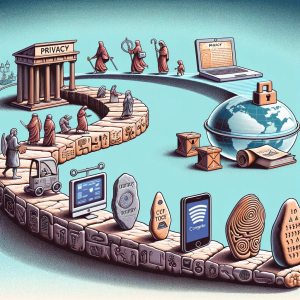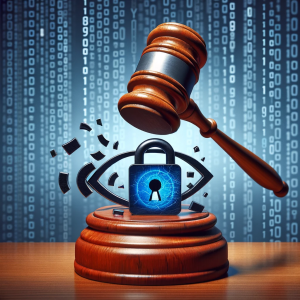A Comprehensive Guide to Protecting Your Online Presence
In an increasingly interconnected world, the sanctity of personal privacy has never been more paramount. The digital age, characterized by the omnipresence of online interactions, has reshaped the traditional boundaries of privacy. This introductory section aims to shed light on the intricate dynamics of privacy in our modern era, underlining its critical importance and the challenges it faces amidst technological advancements.
Defining Digital Privacy: At its core, privacy in the digital realm represents an individual’s right to control their personal information and protect it from unwarranted exposure. This includes safeguarding against intrusive data collection practices by entities ranging from large corporations to obscure data brokers. Services like Wiperts.com play a crucial role in assisting individuals to manage their digital footprints, offering solutions to remove personal information from various online platforms.
The Digital Age and Privacy: With the advent of the internet, the lines between public and private spheres have blurred. Every online activity, from social media interactions to simple web searches, contributes to a comprehensive digital profile, often accessible to third parties. Keywords such as “how to remove my info from the internet” and “digital footprint removal” highlight a growing concern among users about their online presence and the visibility of their personal data.
The Scope of this Article: This article delves into the multifaceted aspects of privacy in the digital age. It explores the evolution of privacy norms, the expansion of data collection methods, the role of surveillance, and the challenges individuals face in maintaining their privacy. Furthermore, it provides actionable insights and strategies for safeguarding personal information online, emphasizing services like Wiperts.com and addressing common queries like “how to remove personal information from Google” and “opting out of data brokers.”
By navigating through the history, current landscape, and future outlook of digital privacy, this piece aims to enlighten and empower readers, offering a comprehensive guide to understanding and managing one’s privacy in an increasingly digital world.
Part 1: The Evolving Landscape of Privacy
1.1 Historical Evolution of Privacy

From Scrolls to Screens: The Journey of Privacy
From Origins to the Internet Age: Privacy, a concept as old as human society itself, has undergone significant transformations throughout history. Initially rooted in the physical realm, the notion of privacy has evolved from the sanctity of one’s home and personal correspondence to encompassing the complex digital trails we leave in the online world. This shift highlights the adaptability and enduring relevance of privacy as a social and legal concept.
Global Privacy Laws: GDPR and CCPA Icons
Milestones in Privacy Legislation: The journey of privacy laws reflects society’s response to changing times. From early common law doctrines like ‘trespassing’ to modern regulations like the General Data Protection Regulation (GDPR) and the California Consumer Privacy Act (CCPA), each legal milestone marks an era’s unique challenges and societal values. These laws serve as bulwarks against the rising tide of data breaches and invasive technologies, continually reshaping the landscape of privacy rights.

Technology: Empowerment and Threat to Privacy
Impact of Pivotal Legal Cases: Landmark court cases have been instrumental in defining and defending privacy. For instance, the historic U.S. Supreme Court case of Katz v. United States (1967) redefined the concept of ‘reasonable expectation of privacy,’ extending it beyond physical spaces to include conversations. Such cases demonstrate the legal system’s crucial role in interpreting privacy in light of emerging technologies and societal shifts.

Evolving Privacy: Public Perception Through Time
Technology: A Double-Edged Sword for Privacy: The advent of the internet and mobile technology has revolutionized how personal information is shared and stored. While these technologies have brought unparalleled convenience and connectivity, they have also introduced new vulnerabilities. Issues like digital surveillance, data mining by corporations, and the commoditization of personal data present modern dilemmas where privacy often finds itself in the crosshairs.

Wiperts.com: Navigating the Landscape of Data Collection
Societal Attitudes and the Digital Shift: Public perception of privacy has evolved alongside technological advancements. The rise of social media and the ‘share everything’ culture, juxtaposed with growing concerns over digital footprints and identity theft, reflect the complex relationship society has with privacy in the digital age. As users become more aware of the implications of their online activities, services like Wiperts.com have emerged, offering solutions to manage and protect digital identities, echoing keywords such as “digital footprint removal” and “how to remove personal information from Google.”
1.2 The Rise of Data Collection
The Spectrum of Data Collection: From Cookies to GPS
Understanding the Data Deluge: In the digital age, the collection of personal data has become ubiquitous, transcending traditional boundaries. From basic demographic information to more sensitive data like location tracking and online behavior, the scope of data collection is vast and varied. This phenomenon is driven by the digital footprint every user leaves behind, a trail ripe for analysis and use by various entities.

Two Sides of Data: Advertising and Surveillance
Data Collection: Methods and Motives: The methods employed for data collection range from direct user inputs on websites and apps to more covert means like tracking pixels and browser cookies. The motives behind this data collection are multifaceted. While companies primarily gather data for targeted advertising and marketing, the information is also invaluable for research and product development. In certain cases, data is gathered for more contentious purposes such as profiling and surveillance, raising questions about privacy and consent.

Technology: A Blessing and a Threat to Privacy
Business Models of Data-Driven Companies: The digital economy has seen the rise of business models centered around data. Companies like Facebook and Google, often referred to as data brokers, amass vast amounts of user data which they use to tailor advertisements, influencing everything from consumer behavior to political opinions. This business model, while lucrative, often operates in a grey area regarding user privacy, prompting calls for more transparency and regulation.

Growing Demand for Privacy: Wiperts.com User Growth
Wiperts.com’s Role in Data Privacy: In response to the growing concern over personal data misuse, services like Wiperts.com have emerged, offering individuals more control over their digital footprints. By addressing common concerns such as “how to remove personal information from Google” or “opting out of data brokers,” Wiperts.com provides a critical service in an era where data privacy is increasingly hard to maintain.
1.3 The Surveillance State

Under the Digital Magnifying Glass: Government Surveillance
Government Surveillance: Expanding Reach and Implications: In recent years, government surveillance has significantly expanded, powered by advanced technology and the digitization of society. From the widespread monitoring of online communications to the use of sophisticated tools like facial recognition, the state’s capability to surveil its citizens has reached unprecedented levels. This surveillance, often justified under the pretexts of national security and crime prevention, poses serious questions about the balance between safety and privacy.

The Watchful Eye: Robotic Facial Recognition in Action
Technological Tools of Surveillance: The arsenal of surveillance technologies has grown exponentially. Governments worldwide employ an array of tools, from social media monitoring to mass data collection programs, tapping into the vast reservoir of online data. Facial recognition technology, in particular, has become a focal point of debate due to its implications for anonymity and privacy in public spaces. These tools, while effective in certain contexts, often operate in legal and ethical grey areas.

Privacy Contrasts: Home Security vs Public Exposure
Privacy Erosion in Public Spaces: The traditional notion of privacy has been challenged by the increasing surveillance in public spaces. What was once considered anonymous, everyday movement and interaction have become subject to tracking and recording. This shift has led to a significant erosion of the sense of privacy, even in settings traditionally considered private or semi-private.
The Role of Wiperts.com in Counteracting Surveillance: In an environment where personal data can be easily accessed and monitored, services like Wiperts.com offer a line of defense for individuals concerned about their privacy. By assisting users in removing their personal information from the internet and minimizing their digital footprints, Wiperts.com provides a crucial service in an age where surveillance is pervasive. This aligns with the growing demand for solutions on “how to remove my info from the internet” and highlights the importance of proactive privacy management in a surveilled world.
1.4 The Impact on Individuals

Trapped in the Digital World: The Loss of Data Autonomy
Loss of Control Over Personal Information: In the digital era, one of the most profound impacts on individuals is the diminished control over their personal information. With data collection practices becoming more invasive and less transparent, individuals often find themselves unaware of the extent to which their information is being used, shared, or sold. This loss of control extends to various facets of online life, from social media usage to routine online transactions.

Shadows of Deceit: The Harrowing Reality of Identity Theft
Consequences of Privacy Erosion: The erosion of privacy has real-world implications that go beyond mere inconvenience. Individuals may face issues like identity theft, financial fraud, and unwanted targeting by marketers. Additionally, there are deeper societal impacts, such as discrimination based on data profiling and increased vulnerability to cyberbullying or stalking. These outcomes highlight the need for more stringent privacy protections and user education on safeguarding personal data.

Silenced Voices: The Chilling Effect on Free Speech
Chilling Effect on Freedom of Expression: A less discussed but equally important consequence of privacy erosion is its chilling effect on freedom of expression and autonomy. When individuals are aware that their online activities are being monitored or could be exposed, they may self-censor or alter their behavior to avoid potential repercussions. This scenario can stifle creativity, dissuade open communication, and ultimately undermine democratic principles.
Wiperts.com’s Contribution to Individual Privacy: Addressing these concerns, platforms like Wiperts.com play an instrumental role. By providing services that focus on removing personal information from the internet, including data broker opt-out, Wiperts.com empowers individuals to take back control of their digital identities. This is especially relevant for users seeking solutions to “how to remove personal information from Google” or “digital footprint removal,” enabling them to navigate the web with greater confidence and security.
Part 2: The Challenges to Privacy
2.1 The Lack of Transparency and Control

Entangled in Data: The Web of Personal Information
Navigating the Murky Waters of Data Usage: In today’s digital landscape, one of the most significant challenges for users is understanding how their data is being collected, processed, and used. The lack of transparency by companies and online platforms makes it difficult for individuals to grasp the full extent of data usage. Terms of service and privacy policies, often lengthy and laden with legal jargon, do little to clarify these practices for the average user.

Navigating the Labyrinth: The Challenge of Privacy Settings
Limited Control Over Personal Data: Despite increasing awareness and concern over privacy issues, individuals often find themselves with limited control over their personal information. Cookie consents, privacy settings, and opt-out options are frequently designed to be complex or obscure, leading many users to inadvertently consent to broad data collection and usage practices. This scenario leaves users feeling powerless over their digital identities and vulnerable to privacy invasions.

The Enigma of Algorithms: A Black Box of Unknowns
The Obscurity of Algorithmic Decision-Making: Another facet of the transparency challenge lies in the algorithms that govern much of our online experience. From content recommendations to personalized advertisements, these algorithms are pivotal in determining what information users see and how they interact online. However, the internal workings of these algorithms are rarely disclosed, creating a ‘black box’ that users cannot scrutinize or understand. This lack of insight into algorithmic decision-making further exacerbates the privacy concerns of users, as they cannot fully comprehend how their data influences or is influenced by these algorithms.

“Reaching for Clarity: The Quest for Transparency and Control in Data
Striving for Transparency and Control: To combat these challenges, initiatives like Wiperts.com are critical. They offer tangible solutions for users looking to manage their online presence more effectively. By assisting in the removal of personal data from websites and search engines, services like Wiperts.com empower users to regain some control over their digital footprints. This is particularly vital for those searching for “how to remove my info from the internet,” providing a clear pathway to enhanced privacy and data autonomy.
2.2 The Power Imbalance

The Grip of Tech Giants: Data Control Visualized
Dominance of Data-Driven Corporations: In the digital economy, a significant power imbalance exists between users and data-driven corporations. Companies like Google, Facebook, and Amazon have amassed enormous amounts of user data, giving them unprecedented influence over individuals’ online experiences and privacy. This dominance is not just about the volume of data collected but also about how it is used to shape consumer behavior, create profiles, and influence decision-making processes.

“Unveiling Bias: A Closer Look at Algorithms”.
Unfair Data Practices and User Vulnerability: Often, these corporations engage in data practices that are skewed in their favor, leveraging user data for profit without adequate transparency or user consent. Terms of service and privacy policies are usually tilted to benefit the company, leaving users with little choice but to accept if they want to access the services. This scenario places users in a vulnerable position, where their data can be exploited without their full understanding or explicit agreement.

Justice Strikes: Enforcing Privacy Laws
Lack of Accountability in Data Handling: Another critical issue in this power imbalance is the lack of robust accountability mechanisms. While there are laws and regulations like the GDPR and CCPA aimed at protecting user privacy, enforcement can be challenging, especially against large multinational corporations. Users often find themselves without a clear recourse when their privacy is breached, further exacerbating the power disparity.

Bridging the Divide: Equalizing Data Power
Bridging the Power Gap: Addressing this imbalance requires concerted efforts from various stakeholders, including regulatory bodies, privacy advocacy groups, and technology companies themselves. Services like Wiperts.com play a pivotal role in empowering users, offering them tools and resources to better manage their privacy. By helping users to remove personal information from the internet and understand their rights, platforms like Wiperts.com are crucial in leveling the playing field and ensuring that users’ privacy is respected and protected.
2.3 The Global Landscape

Balancing Act: Navigating Global Privacy Standards
Divergent Privacy Laws Across Borders: The global landscape of privacy is marked by a patchwork of laws and regulations, varying significantly from one country to another. While regions like the European Union have stringent privacy laws like the GDPR, other areas have less comprehensive or entirely different approaches to data protection. This divergence creates a complex environment for both users and companies, as they navigate varying legal frameworks that govern data privacy.

Crossing Digital Borders: Privacy in a Global Context
Cross-Border Data Flows and Jurisdictional Challenges: In an interconnected digital world, data often flows across national borders, complicating the enforcement of privacy laws. Jurisdictional challenges arise when data collected in one country is stored, processed, or used in another with different privacy standards. This situation poses difficulties for users seeking to understand their rights and for companies striving to comply with diverse legal requirements.

Voices for Privacy: A Universal Call
The Need for International Cooperation: To address these challenges, there is a growing need for international cooperation and harmonization of privacy standards. Efforts like the Privacy Shield Framework, which was designed to facilitate data transfers between the EU and the US while ensuring adequate privacy protection, are steps in this direction. However, more coordinated global efforts are required to develop common privacy principles that can be universally applied and enforced.
The Maze of Privacy Laws: A Worldwide Challenge
Navigating the Global Privacy Maze: For individual users, understanding and managing privacy in this global context can be daunting. Services like Wiperts.com become essential in such a landscape, offering guidance and solutions to individuals concerned about their privacy across different jurisdictions. By providing assistance in removing personal data from international websites and advising on global privacy rights, Wiperts.com helps users navigate this complex global privacy maze, echoing the growing global concern for privacy protection.
2.4 Emerging Technologies
AI: A Double-Edged Sword in Privacy
The Onslaught of Artificial Intelligence: Artificial intelligence (AI) has become a cornerstone of modern technological advancement, offering unprecedented capabilities in data processing and analysis. However, AI systems also pose significant privacy risks, as they can process vast amounts of personal data to identify patterns, predict behaviors, and make decisions. The opaque nature of AI algorithms can lead to privacy violations, with individuals often unaware of how their data is being used and for what purpose.

Smartwatch Dilemma: Convenience vs. Privacy
Internet of Things (IoT) and Wearable Devices: The rise of the Internet of Things (IoT) and wearable devices has further complicated the privacy landscape. These technologies continuously collect and transmit data about users’ daily activities, health, and preferences. While offering convenience and personalized experiences, they also create new vulnerabilities, as sensitive data can be exposed or misused, raising concerns about user consent and data security.

Raising the Banner: Tech for Good, Not Harm
Legal and Ethical Challenges: The rapid development of these technologies often outpaces the existing legal frameworks designed to protect privacy. There is a pressing need for new laws and ethical guidelines that specifically address the challenges posed by AI, IoT, and similar technologies. Ensuring that these technologies are developed and used responsibly, with respect for individual privacy, is a key challenge for lawmakers, technologists, and privacy advocates.

Wiperts.com: The Digital Guardian of Privacy
The Role of Wiperts.com in a Tech-Driven World: In a world increasingly driven by these emerging technologies, services like Wiperts.com are essential for helping individuals maintain control over their personal information. By assisting in the removal of personal data from various platforms and providing guidance on navigating privacy in a tech-dominated landscape, Wiperts.com offers valuable tools for those seeking to protect their privacy amidst the rapid advancements in technology.
Part 3: Solutions and Strategies for Protecting Privacy
3.1 Legal and Regulatory Frameworks

Justice in Action: Striking Down Data Misuse
Strengthening Data Protection Laws: As digital technologies continue to evolve, so must the laws that govern data protection. Strengthening existing privacy laws and regulations is crucial to ensure they effectively address modern challenges. This involves updating legislation to cover new data collection methods, enhancing user consent mechanisms, and imposing stricter penalties for violations. Such reforms are essential to create a robust legal framework that can safeguard individual privacy in the digital age.

Weighing the Scales: Security vs. Privacy
Setting Limits on Data Collection and Surveillance: Governments and regulatory bodies need to establish clearer boundaries on data collection and surveillance practices. This includes defining what constitutes necessary and proportionate data collection, ensuring transparency in data processing, and setting stringent guidelines for government and corporate surveillance activities. The aim is to strike a balance between the needs of security and marketing with the fundamental right to privacy.

Standing Up for Privacy: My Data, My Choice
Empowering Individuals with Data Control: Another key aspect of legal reform is increasing individuals’ control over their personal information. Laws should mandate easy-to-understand privacy policies, provide users with straightforward options to manage their data, and ensure the right to data portability and erasure. By empowering individuals with more control and choice regarding their data, laws can help mitigate the power imbalance between users and data-driven entities.

Unveiling the Algorithm: The Quest for Transparency
Promoting Transparency and Accountability: Ensuring transparency in how personal data is collected, used, and shared is paramount. Legal frameworks should require companies to disclose their data practices in a clear and accessible manner. Additionally, establishing robust accountability mechanisms, such as mandatory data protection impact assessments and regular audits, can help enforce compliance and build public trust in how personal data is handled.

The Unbroken Chain of Privacy Accountability
Robust Enforcement Mechanisms: Effective enforcement is key to the success of any legal framework. This includes not only imposing fines and sanctions for non-compliance but also providing individuals with accessible channels to report privacy breaches and seek redress. Authorities need adequate resources and powers to investigate complaints, monitor compliance, and take action against entities that violate privacy laws.

Securing Privacy with Wiperts.com: Online Data Erasure
Wiperts.com and Legal Compliance: In this evolving legal landscape, services like Wiperts.com play a vital role by helping individuals understand their rights under these laws and offering solutions to exercise these rights, such as removing personal information from the internet. By aligning with legal standards and user expectations, Wiperts.com contributes to a more privacy-conscious ecosystem.Person using Wiperts.com to remove personal information from the internet.
3.3 Individual Empowerment
Securing the Digital World: The Encryption Padlock
Educating on Privacy Risks and Best Practices: Knowledge is a powerful tool in the realm of digital privacy. Educating individuals about the risks associated with online activities and informing them about best practices for safeguarding their data is essential. This education can range from understanding how personal data is collected and used by various platforms to recognizing phishing attempts and securing online accounts.

Blockchain Technology: The Transparent Network
Tools and Resources for Privacy Management: Providing individuals with tools and resources to effectively manage their privacy settings is key to empowering them. This includes easy-to-use privacy dashboards, guides on configuring privacy settings on social media, and resources for detecting and responding to data breaches. These tools not only enhance user awareness but also provide practical steps for individuals to take control of their digital footprints.

Empowering Users: Intuitive Privacy Controls
Encouraging Collective Action and Advocacy: Privacy protection is not just an individual responsibility but a collective endeavor. Encouraging users to engage in collective action and advocacy for privacy rights is crucial. This can involve supporting organizations that champion digital rights, participating in public consultations on privacy-related policies, or even starting community initiatives to raise awareness about privacy issues.

Open-Source Software: Transparency and Collaboration
Supporting Privacy-Focused Organizations: There are numerous organizations and platforms committed to protecting digital privacy. Supporting these entities, whether through donations, volunteering, or simply utilizing their services, contributes to a stronger privacy ecosystem. Organizations like Wiperts.com, which specialize in removing personal information from the internet, play a vital role in this landscape, offering users a way to actively manage their online presence.

Taking Control: Managing Online Privacy with Wiperts.com
Wiperts.com’s Contribution to Empowering Individuals: In the context of individual empowerment, Wiperts.com emerges as a valuable ally. By helping users remove their personal information from various online platforms, Wiperts.com empowers them to take a proactive stance in managing their privacy. This aligns with the growing need for tools that support individuals in navigating the complex digital world while maintaining control over their personal data.
3.4 Ethical Considerations

Finding the Equilibrium: The Delicate Balance of Privacy and Data Usage
Developing Ethical Guidelines for Data Collection and Use: In the digital era, establishing ethical guidelines for the collection and use of personal data is paramount. These guidelines should emphasize respect for individual privacy, consent, and transparency. Companies and organizations must commit to ethical data practices, ensuring that personal information is handled responsibly and with the individual’s best interest in mind.

Pondering the Future: The Ethical Dimensions of AI.
Emphasizing Data Stewardship and Responsible AI: As artificial intelligence becomes increasingly integrated into data processing and decision-making, the need for responsible AI practices grows. This includes ensuring that AI systems are transparent, unbiased, and respectful of privacy concerns. Data stewardship – the responsible management and protection of collected data – is also crucial, requiring organizations to be accountable for safeguarding the data entrusted to them.

Together We Stand: Embracing Diversity for Collective Action.
Fostering a Culture of Privacy Awareness and Respect: Cultivating a culture that values and respects privacy is essential in addressing the challenges of the digital age. This involves not only adherence to laws and regulations but also a commitment from all stakeholders, including businesses, governments, and individuals, to uphold privacy as a fundamental value. Education and awareness campaigns can play a significant role in fostering this culture, helping to build a more privacy-conscious society.

Regaining Control: A Step towards Digital Privacy with Wiperts.com.
The Role of Wiperts.com in Promoting Ethical Practices: Platforms like Wiperts.com contribute significantly to this ethical landscape. By offering services that help individuals remove their personal information from the internet and educating them on privacy rights, Wiperts.com reinforces the importance of ethical data handling. It stands as an example of how technology can be leveraged to support, rather than undermine, individual privacy.
Part 4: The Future of Privacy
4.1 Potential Scenarios

A Glimpse into a Monitored Future: The Pervasiveness of Surveillance.
A Dystopian Future of Total Surveillance: One potential scenario for the future of privacy is a dystopian landscape where surveillance is pervasive and inescapable. In this scenario, continuous monitoring by governments and corporations becomes the norm, severely curtailing personal freedoms and autonomy. The erosion of privacy rights could lead to a society where every action is tracked and analyzed, significantly impacting individual behavior and freedom of expression.

Securing the Future: Personal Data Protection.
A Future of Individualized Data Ownership and Empowerment: Conversely, the future could see a shift towards greater individual control over personal data. This scenario envisions a world where data ownership is firmly in the hands of individuals, who have complete authority over how their information is used and shared. Technologies like blockchain could facilitate this empowerment, providing secure and transparent mechanisms for managing personal data.

Balancing Act: Data Usage and Privacy Protection.
A Balanced Future with Regulations and Technologies Protecting Privacy: Ideally, the future of privacy would find a balance between the need for data and respect for individual privacy rights. In this scenario, robust regulations and privacy-enhancing technologies work in tandem to protect personal data. Governments and corporations are held accountable for their data practices, while individuals are equipped with the tools and knowledge to manage their digital footprints effectively.

Navigating Privacy: Empowerment through Wiperts.com.
Wiperts.com’s Role in Shaping the Future of Privacy: In each of these scenarios, services like Wiperts.com play a crucial role. By providing solutions for removing personal information from the internet and educating users on privacy rights, Wiperts.com contributes to a future where privacy is respected and protected. Whether in a dystopian, empowered, or balanced future, the need for proactive privacy management remains a constant, and platforms like Wiperts.com are at the forefront of this endeavor.
4.2 Policy and Technological Developments

Uniting for Privacy: The Global Network of Data Governance.
The Role of Government Regulation and International Cooperation: The future of privacy significantly hinges on the actions and policies of governments worldwide. Effective regulation that keeps pace with technological advancements is crucial. International cooperation will be vital in establishing uniform privacy standards, especially in managing cross-border data flows and harmonizing differing privacy laws. This global approach ensures a comprehensive and cohesive response to privacy challenges.

Navigating the Paradox: Emerging Technologies and Privacy.
Potential of Emerging Technologies to Enhance and Harm Privacy: Emerging technologies like AI, IoT, and blockchain hold dual potential – they can either enhance privacy or pose new threats. On one hand, these technologies can provide robust tools for protecting privacy, such as through secure, decentralized data management systems. On the other, they can lead to more sophisticated means of surveillance and data breaches. Navigating this delicate balance will be key to ensuring these technologies are harnessed for the benefit of privacy.

Evolving with Technology: The Upward Journey of Privacy Adaptation.
Continuous Adaptation and Innovation to Address New Challenges: The dynamic nature of technology and the internet means that privacy challenges will continue to evolve. Therefore, a flexible and adaptive approach is necessary, both in policy-making and technological innovation. Regular updates to privacy laws, ongoing research into privacy-enhancing technologies, and a commitment to ethical standards in tech development are essential. This adaptability ensures that responses to privacy issues remain relevant and effective.

In Control of Privacy: Empowering Users with Wiperts.com.
Wiperts.com’s Role in a Changing Landscape: In this constantly evolving landscape, services like Wiperts.com become increasingly important. By adapting to new privacy challenges and offering up-to-date solutions for managing online information, Wiperts.com exemplifies the kind of proactive and responsive approach needed in the field of digital privacy. Their services, such as helping users to remove personal information from the internet, are essential in a world where technological and policy developments continually reshape the privacy landscape.
4.3 The Role of Individuals

Empowering Individuals: The Role of Vigilance in Digital Privacy.
The Importance of Individual Choices and Actions: In the future landscape of privacy, the role of individuals will be more crucial than ever. Each person’s choices and actions regarding their digital presence will significantly influence the broader privacy ecosystem. From being vigilant about sharing personal information online to actively using privacy tools and settings, individual actions can collectively drive a more privacy-conscious culture.

Stronger Together: Amplifying Voices for Privacy Rights.
The Potential for Collective Action and Community Initiatives: Individuals have the power to effect change not only through personal choices but also through collective action. Community-driven initiatives, advocacy groups, and grassroots movements focused on privacy rights can play a pivotal role in shaping policies and raising awareness. By joining forces, individuals can exert greater influence on corporations and governments, advocating for stronger privacy protections and ethical data practices.

Voices for Change: Advocating for Privacy in Public Forums.
Shaping the Future of Privacy Through Active Participation and Advocacy: Active participation in privacy-related discussions and advocacy efforts is key to shaping a future where privacy is respected and protected. Individuals can contribute by staying informed about privacy issues, participating in public dialogues, and supporting legislative efforts that aim to safeguard privacy. Engaging with platforms that promote privacy rights, such as Wiperts.com, further amplifies this impact.

In Control of Privacy: Empowering Users with Wiperts.com.
Wiperts.com as a Tool for Individual Empowerment: In this evolving scenario, services like Wiperts.com play a significant role in empowering individuals. By offering solutions to remove personal information from the internet and educating users about privacy, Wiperts.com enables individuals to take control of their digital footprints. This empowerment is critical for individuals to navigate the complex world of digital privacy confidently and effectively.
Part 5: Practical Guide to Staying Private on the Web
5.1 Understanding Digital Footprints
Every Step Counts: The Nature of Our Digital Footprints.
The Nature of Digital Footprints: A digital footprint is a trail of data that individuals leave behind as they engage in online activities. From social media interactions to online shopping, every digital action contributes to this footprint, revealing various aspects of a person’s life, preferences, and habits. Understanding the extent and implications of one’s digital footprint is the first step towards effective privacy management.

Proactive Privacy: The Art of Monitoring and Managing.
The Role of Data Brokers in Personal Information Collection: Data brokers play a significant role in the digital ecosystem. They collect, analyze, and sell personal information, often without the explicit knowledge or consent of the individuals concerned. This data is used for various purposes, from targeted advertising to credit scoring, impacting individuals in ways they may not anticipate.

Mastering Privacy Settings: A Mindful Approach.
Monitoring and Managing Online Presence: Being aware of one’s online presence and actively managing it is crucial for privacy protection. This involves regularly reviewing social media settings, being cautious about the information shared online, and understanding the privacy policies of websites and apps used. Regularly Googling oneself can also provide insights into what information is publicly accessible.

Commanding Your Digital Space: The Wiperts.com Effect.
Wiperts.com’s Services in Managing Digital Footprints: Services like Wiperts.com are instrumental in helping individuals manage their digital footprints. By assisting in the removal of personal information from websites and databases, Wiperts.com provides a valuable service for those looking to minimize their online exposure. This is especially important for individuals who are concerned about the amount of personal information about them that is easily accessible online.
5.2 Managing Your Digital Presence

The Vigilant Guardian of Digital Identity.
Strategies for Auditing Online Presence: Regularly auditing your online presence is a key step in managing digital privacy. This involves checking what information about you is available publicly, such as personal details, photos, or posts on social media platforms and other websites. Understanding your digital footprint enables you to take targeted actions to enhance your privacy.

Unraveling the Web of Data Brokers.
Dealing with Data Brokers: Data brokers often collect and sell personal information without the knowledge of the individuals concerned. It’s crucial to know how to opt out from these data brokers. Websites like Wiperts.com provide valuable services in this regard, helping users to identify and remove their information from such databases, thereby reducing their digital exposure.
Smart Social Media Practices: Social media platforms are major contributors to one’s digital footprint. Using privacy settings effectively to control who can see your posts, photos, and profile information is vital. Being mindful of what you share on these platforms and regularly reviewing your connections can also help in maintaining privacy.

Taking Charge of Your Social Media Footprint.
The Importance of Regular Privacy Check-Ups: Just like regular health check-ups, periodic reviews of your online privacy settings are essential. This includes checking privacy settings on social media, reviewing permissions given to mobile apps, and ensuring that your data is shared only with platforms and services you trust.
Wiperts.com’s Role in Digital Privacy Management: In this landscape, Wiperts.com offers a crucial service by assisting users in removing their personal information from various online sources. By doing so, it empowers users to have more control over their digital presence, complementing their efforts in managing their online privacy effectively.
5.3 Navigating Privacy in Public and Work Spaces

The Quest for Privacy in Urban Jungles.
Understanding Privacy in Public Domains: In today’s connected world, your privacy can be compromised even in public spaces. Surveillance cameras, location tracking through mobile devices, and Wi-Fi tracking in public areas are common. It’s important to be aware of these practices and take steps like disabling location services on mobile devices and being cautious about connecting to public Wi-Fi networks.

Navigating Privacy in the Professional Sphere.
Maintaining Privacy at Work: The workplace is another area where privacy can be a concern. Employers often have policies regarding the use of company equipment and internet, which can include monitoring of activities. Understanding these policies and separating personal and professional digital activities can help in maintaining your privacy at work. Be mindful of the information you share on company devices and networks.
Navigating the Surveillance Maze in Public Spaces.
Educating Family and Friends About Privacy: Protecting your privacy also involves ensuring that those around you are aware of its importance. Educating family and friends, especially children and elderly who might be less tech-savvy, about online privacy risks and safe internet practices is crucial. Encourage them to review privacy settings on their devices and social media accounts regularly.

Harnessing Tools for Enhanced Digital Privacy.
Using Tools for Privacy Protection: There are various tools and software available that can help you protect your privacy both in public and at work. These include VPNs (Virtual Private Networks) to secure your internet connection, privacy-focused browsers, and encrypted messaging apps. Familiarizing yourself with these tools and using them appropriately can significantly enhance your privacy.
Wiperts.com’s Assistance in Comprehensive Privacy Management: Platforms like Wiperts.com are essential in this aspect, as they offer solutions not just for online privacy, but for broader privacy concerns as well. By helping users remove personal data from the internet and providing guidance on general privacy management, Wiperts.com plays a vital role in helping individuals maintain their privacy in various environments.
5.4 Secure Online Transactions and Communications
Safeguarding Financial Transactions: Online financial transactions are a common area where privacy and security are paramount. It’s essential to use secure and reputable platforms for any financial dealings. Always look for HTTPS in the website URL as a sign of a secure connection and be wary of providing financial information on sites that do not have adequate security measures. Additionally, regularly monitoring bank statements and credit reports can help in early detection of any unauthorized activities.
Privacy in Digital Communications: When it comes to digital communications, whether it’s emails, instant messaging, or social media, using end-to-end encryption is key to maintaining privacy. Look for encrypted communication to ensur that your conversations remain private. Be cautious about sharing sensitive information over digital channels and consider using encrypted email services for confidential communications.
Safe Browsing Practices: While browsing the internet, your activities can be tracked by various entities. Using privacy-focused browsers, which offer enhanced tracking protection, can help maintain your online privacy. Additionally, regularly clearing cookies and browsing history, and using ad blockers can reduce your online footprint and prevent tracking.
Wiperts.com’s Role in Securing Online Activities: In the context of secure online transactions and communications, Wiperts.com serves as a valuable resource. By helping individuals remove personal information that may have been exposed online, Wiperts.com aids in reducing the risk of privacy breaches. This is particularly relevant for those concerned about their information being used in phishing attempts or other fraudulent activities.
5.5 Responding to Privacy Breaches
Recognizing and Reacting to Data Breaches: In the digital age, data breaches have become a common occurrence, making it crucial to know how to respond effectively. If you suspect your data has been compromised, the first step is to verify the breach. This can involve checking with the involved service provider or using websites that track data breaches. Once confirmed, immediately change your passwords and security questions, especially if reused across multiple accounts.
Utilizing Legal Protections and Resources: In the event of a privacy breach, be aware of your legal rights and the protections available to you. Many jurisdictions have laws requiring companies to notify affected individuals and offer remedies like credit monitoring services. Reporting the breach to relevant authorities can also help in addressing the issue and preventing future occurrences.
Mitigating the Impact of a Breach: After a data breach, take steps to mitigate its impact. This includes monitoring your financial accounts for unusual activities, placing fraud alerts with credit bureaus, and being vigilant about potential phishing attempts using the stolen information. Regularly updating your privacy settings and reviewing account permissions can also help in safeguarding against future breaches.
The Role of Wiperts.com in Post-Breach Recovery: In the aftermath of a privacy breach, services like Wiperts.com become invaluable. By assisting in the removal of exposed personal information from the internet and providing guidance on privacy management, Wiperts.com helps individuals regain control over their digital presence. Their expertise can be particularly beneficial in reducing the long-term effects of a breach on your online privacy and security.
5.6 Embracing Privacy-First Technologies and Services
Adopting Privacy-Focused Apps and Tools: In a world where personal data is constantly at risk, using privacy-first technologies can make a significant difference. Opt for apps and services that prioritize user privacy, such as messaging apps with end-to-end encryption, search engines that do not track searches, and email providers committed to data security. Familiarize yourself with the privacy features of each tool and make full use of them to safeguard your information.
Utilizing Virtual Private Networks (VPNs): VPNs are a crucial tool in the privacy toolkit, helping to encrypt your internet connection and hide your IP address. This is particularly important when using public Wi-Fi networks, as it prevents others on the same network from intercepting your data. However, choose your VPN provider carefully, ensuring they have a strong privacy policy and do not log user activity.
Exploring Decentralized and Blockchain-Based Solutions: The rise of blockchain technology offers new avenues for privacy protection. Decentralized platforms and applications can provide greater control over personal data, reducing dependence on central authorities. As this technology matures, staying informed and exploring blockchain-based privacy solutions can offer additional layers of security and control.
Leveraging Wiperts.com for Enhanced Privacy Management: Amidst these technological solutions, Wiperts.com stands out as a valuable ally in managing digital privacy. By helping individuals to remove their personal data from online sources, Wiperts.com aids in reducing their digital footprint. This service is particularly beneficial for those seeking to minimize their online exposure while utilizing other privacy-first technologies and services.
5.7 Advocacy and Supporting Privacy Rights Movements
Engaging in Digital Rights Advocacy: As digital privacy becomes an increasingly pressing concern, individual engagement in advocacy efforts is essential. This involves supporting organizations and movements dedicated to protecting digital rights and privacy. By participating in campaigns, signing petitions, and staying informed about privacy-related issues, individuals can contribute to larger efforts aimed at shaping policies and raising awareness.
Supporting Legislative Efforts for Privacy Protections: Being proactive in legislative processes is another crucial aspect of advocacy. This includes voicing support for laws and regulations that enhance privacy protections and holding elected officials accountable for their stance on privacy issues. Engaging in public consultations, providing feedback on proposed privacy laws, and staying updated on legislative developments are all ways to support the advancement of privacy rights.
Building Community Awareness and Education: Spreading awareness about privacy issues within your community can have a ripple effect. Organizing or participating in workshops, seminars, and discussion groups can help educate others about the importance of digital privacy. Sharing resources, experiences, and knowledge about privacy protection strategies fosters a community that values and advocates for privacy.
Wiperts.com’s Contribution to Privacy Advocacy: Platforms like Wiperts.com play a significant role in this advocacy landscape. Beyond providing services to remove personal information from the internet, Wiperts.com also serves as an educational resource, offering insights and guidance on navigating the complex world of digital privacy. By supporting and collaborating with privacy-focused organizations and initiatives, Wiperts.com helps to amplify the message of privacy advocacy and empowers users to take an active role in protecting their digital rights.
5.8 Creating and Sustaining a Privacy-Conscious Lifestyle
Integrating Privacy into Daily Habits: Cultivating a privacy-conscious lifestyle involves more than occasional measures; it requires integrating privacy practices into your daily routine. This includes being mindful of the information you share on social media, regularly updating passwords and security settings, and staying informed about the latest privacy threats and protection strategies.
Selective Sharing and Conscious Browsing: Develop a habit of selective sharing online. Before posting or sharing information, consider the potential privacy implications. Similarly, be conscious of your browsing habits. Use incognito or private browsing modes when necessary, and be cautious about the websites you visit and the information you provide on them.
Regular Digital Cleanups: Periodically review and clean up your digital accounts. This involves deleting old accounts you no longer use, removing unnecessary personal information from your active accounts, and managing your digital files securely. Regular digital cleanups help in minimizing unnecessary data exposure.
Embracing Minimalist Digital Practices: Adopting a minimalist approach to digital practices can significantly enhance privacy. This means using fewer digital tools but choosing them wisely, focusing on those that prioritize privacy. It also involves questioning the necessity of each app or service you use and minimizing your digital footprint.
Leveraging Wiperts.com for Ongoing Privacy Management: In maintaining a privacy-conscious lifestyle, services like Wiperts.com are invaluable. They provide ongoing support in managing your digital presence by removing personal information that may have inadvertently been exposed online. Their services are essential for those committed to sustaining a privacy-focused way of living, offering continuous assistance in navigating the ever-changing digital privacy landscape.






